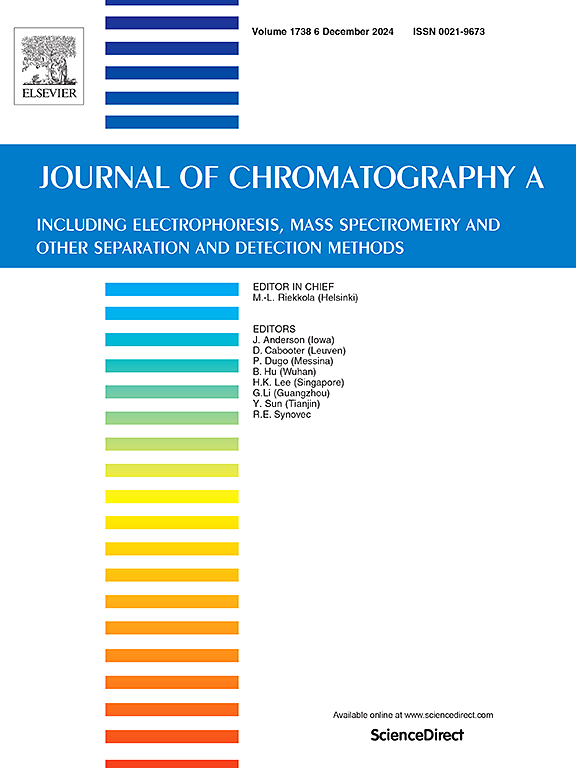Mitigating the effects of organic solvents in sample diluents for ion chromatography: A comprehensive study and guidelines for optimization
IF 3.8
2区 化学
Q1 BIOCHEMICAL RESEARCH METHODS
引用次数: 0
Abstract
Ion Chromatography (IC), the gold standard for the separation and analysis of ionic species, has been extensively used for detection of ions in industrial applications. Pharmaceutical samples with limited water solubility often require the use of organic solvents as diluents, which can pose significant challenges on IC analysis. Herein, the effects of various organic solvents as sample diluents in IC for anion analysis are systematically investigated. Electrochemically stable solvents such as 2-propanol (IPA), acetone, and dimethyl sulfoxide (DMSO) were found to have the least impact on the IC baseline. For solvents with a greater impact, a solvent dilution device (SDD) has been designed to minimize their effects. The device effectively diluted the organic solvents before they reached the suppressor electrode, reducing the generation of oxidized products. The results showed that the baseline stability and separation efficiency of IC can be maintained when using a wide range of organic solvents as diluents. Notably, the use of a solvent dilution device enabled good recovery of ions in various active pharmaceutical ingredients and significantly enhanced the signal to noise ratio of early-eluting ions compared to analyses conducted without the device. Guidelines are proposed to minimize the impact of organic solvents in IC sample preparation and anion analysis. The study also investigates the origin of impurity peaks introduced by the organic solvents and demonstrated the effectiveness of an ion-exchange resin treatment for their removal. Overall, this study provides insights for the use of organic solvents as IC diluents and offers practical solutions to overcome their challenges in pharmaceutical applications.
减轻离子色谱样品稀释剂中有机溶剂的影响:一项全面的研究和优化指南
离子色谱(Ion Chromatography, IC)作为离子分离和分析的金标准,已广泛应用于工业中离子的检测。水溶性有限的药物样品通常需要使用有机溶剂作为稀释剂,这可能对IC分析构成重大挑战。本文系统地研究了不同有机溶剂作为样品稀释剂对IC阴离子分析的影响。发现电化学稳定的溶剂,如2-丙醇(IPA)、丙酮和二甲亚砜(DMSO)对IC基线的影响最小。对于影响较大的溶剂,设计了溶剂稀释装置(SDD),以尽量减少其影响。该装置在有机溶剂到达抑制电极之前有效地稀释了有机溶剂,减少了氧化产物的产生。结果表明,当使用多种有机溶剂作为稀释剂时,可以保持IC的基线稳定性和分离效率。值得注意的是,使用溶剂稀释装置可以很好地回收各种活性药物成分中的离子,并且与不使用该装置进行的分析相比,显着提高了早期洗脱离子的信噪比。指南提出,以尽量减少有机溶剂的影响,在IC样品制备和阴离子分析。该研究还调查了由有机溶剂引入的杂质峰的来源,并证明了离子交换树脂处理去除杂质的有效性。总的来说,本研究为有机溶剂作为IC稀释剂的使用提供了见解,并为克服其在制药应用中的挑战提供了实用的解决方案。
本文章由计算机程序翻译,如有差异,请以英文原文为准。
求助全文
约1分钟内获得全文
求助全文
来源期刊

Journal of Chromatography A
化学-分析化学
CiteScore
7.90
自引率
14.60%
发文量
742
审稿时长
45 days
期刊介绍:
The Journal of Chromatography A provides a forum for the publication of original research and critical reviews on all aspects of fundamental and applied separation science. The scope of the journal includes chromatography and related techniques, electromigration techniques (e.g. electrophoresis, electrochromatography), hyphenated and other multi-dimensional techniques, sample preparation, and detection methods such as mass spectrometry. Contributions consist mainly of research papers dealing with the theory of separation methods, instrumental developments and analytical and preparative applications of general interest.
 求助内容:
求助内容: 应助结果提醒方式:
应助结果提醒方式:


